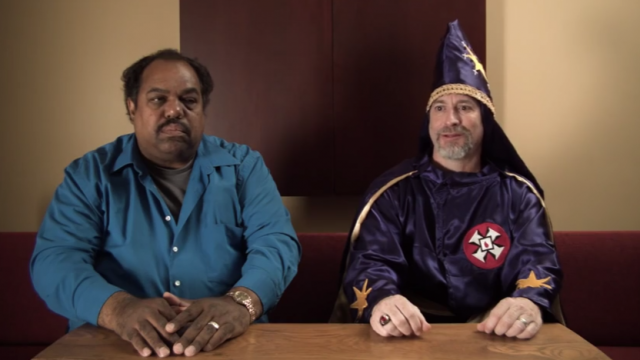“When Two Enemies Are Talking, They’re Not Fighting”

Not so long ago I had as a guest on my radio show Fargo-area citizen Peter Tefft. You can listen to the interview here.
At the time, in the wake of the violence in Charlottesville, Tefft had been making headlines not only as an attendee of that Virginia rally but as a potential organizer for a similar event in the Fargo area. I wanted to talk to the guy, who is described in the media as a “white nationalist” but describes himself as a “pro-white civil rights leader”, because I think it’s important to try and understand people like him.
I got a lot of grief over it. Here’s one profane example representative of the sort of feedback the interview received.
So why did I talk to someone like Tefft on my radio show? I was actually inspired by Daryl Davis, the subject of a recent documentary called Accidental Courtesy.
Here’s the trailer, the website for the film is here, and it’s actually streaming on Netflix right now.
Davis is an accomplished musician and a black man, and for decades now he’s befriended bigots. Mostly Ku Klux Klan members.
He talks to them. He visits their homes. He attends family events like weddings. And, over time, he’s convinced more than 200 of them to give up their robes, many of which he’s kept as mementos.
He’s summed up his philosophy this way: “When two enemies are talking, they’re not fighting.”
I can’t think of a healthier message for our country right now, when so many would rather punch the opposition than talk to them.
People who embrace hatred are angry. They often feel isolated and misunderstood.
How can we ever hope to change their minds, to turn them away from bigotry, if we meet their hatred with more hate? If we treat their isolation with more isolation?
The Daryl Davis model requires that we engage with one another. We try to understand one another. We try to be friends to one another, even with those inclined to hate us for what we are.
That’s a model not just for engaging the political extremes but for the mainstream too.
What if liberals and conservatives, Republicans and Democrats, stopped assuming the worst about one another and just started talking? What if politics didn’t have to be pitched combat between enemies but instead a competition of contrasting ideas?
Sound too simplistic? Too pollyannish?
Tell that to Davis and his collection of hundreds of Klan robes.




